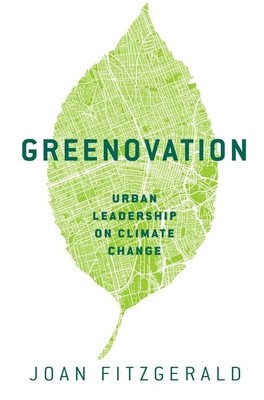
- We will send in 10–14 business days.
- Author: Joan Fitzgerald
- Publisher: Oxford University Press, USA
- ISBN-10: 0197651429
- ISBN-13: 9780197651421
- Format: 15.5 x 23.6 x 1.5 cm, minkšti viršeliai
- Language: English
- SAVE -10% with code: EXTRA
Reviews
Description
Collectively, cities take up a relatively tiny amount of land on the earth, yet they emit 72 percent of greenhouse gas emissions. Clearly, cities need to be at the center of any broad effort to reduce climate change.
In Greenovation, the eminent urban policy scholar Joan Fitzgerald argues that too many cities are only implementing random acts of greenness that will do little to address the climate crisis. She instead calls for "greenovation"--using the city as a test bed for adopting and perfecting green technologies for more energy--efficient buildings, transportation, and infrastructure more broadly. Fitzgerald contends that while many city mayors cite income inequality as a pressing problem, few cities are connecting climate action and social justice-another aspect of greenovation. Focusing on the biggest producers of greenhouse gases in cities, buildings, energy and transportation, Fitzgerald examines how greenovating cities are reducing emissions overall and lays out an agenda for fostering and implementing urban innovations that can help reverse the path toward irrevocable climate damage. Drawing on interviews with practitioners in more than 20 North American and European cities, sheidentifies the strategies and policies they are employing and how support from state, provincial and national governments has supported or thwarted their efforts. A uniquely urban-focused appraisal of the economic, political, and social debates that underpin the drive to "go green," Greenovation helps us understand what is arguably the toughest policy problem of our era: the increasing impact of anthropocentric climate change on modern social life.
EXTRA 10 % discount with code: EXTRA
The promotion ends in 21d.04:30:18
The discount code is valid when purchasing from 10 €. Discounts do not stack.
- Author: Joan Fitzgerald
- Publisher: Oxford University Press, USA
- ISBN-10: 0197651429
- ISBN-13: 9780197651421
- Format: 15.5 x 23.6 x 1.5 cm, minkšti viršeliai
- Language: English English
Collectively, cities take up a relatively tiny amount of land on the earth, yet they emit 72 percent of greenhouse gas emissions. Clearly, cities need to be at the center of any broad effort to reduce climate change.
In Greenovation, the eminent urban policy scholar Joan Fitzgerald argues that too many cities are only implementing random acts of greenness that will do little to address the climate crisis. She instead calls for "greenovation"--using the city as a test bed for adopting and perfecting green technologies for more energy--efficient buildings, transportation, and infrastructure more broadly. Fitzgerald contends that while many city mayors cite income inequality as a pressing problem, few cities are connecting climate action and social justice-another aspect of greenovation. Focusing on the biggest producers of greenhouse gases in cities, buildings, energy and transportation, Fitzgerald examines how greenovating cities are reducing emissions overall and lays out an agenda for fostering and implementing urban innovations that can help reverse the path toward irrevocable climate damage. Drawing on interviews with practitioners in more than 20 North American and European cities, sheidentifies the strategies and policies they are employing and how support from state, provincial and national governments has supported or thwarted their efforts. A uniquely urban-focused appraisal of the economic, political, and social debates that underpin the drive to "go green," Greenovation helps us understand what is arguably the toughest policy problem of our era: the increasing impact of anthropocentric climate change on modern social life.


Reviews